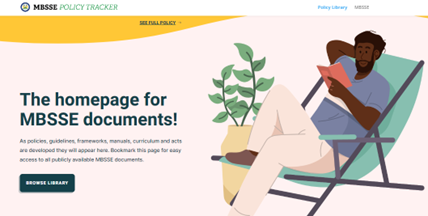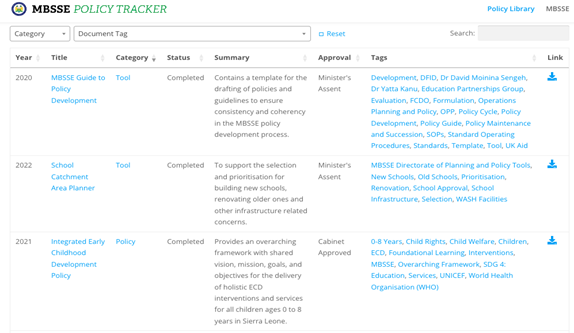Authors: Abdulai Conteh – Programme Manager, Education Partnerships Group, Sierra Leone
Dr. David Sengeh – Minister, Ministry of Basic and Senior Secondary School Education, Sierra Leone
The Ministry of Basic and Secondary School Education (MBSSE) has launched an online library for policies and other relevant documents developed by the Ministry and partners. The introduction of a dedicated online space will provide a comprehensive and up-to-date overview of education policies and documents for use by all stakeholders. The online policy library aims to raise awareness of education goals, ease access to key documents, and inform the programmes and policies of decision-makers in both the state and non-state sectors.
Education policies are the bedrock for increasing access to education, ensuring equity across the education system, and enhancing the quality of education delivery. For the last five (5) years these goals have guided the work of the Government of Sierra Leone, collaborating with development parties and stakeholders in society to transform the country’s education system through a set of robust policies and programmes.

Despite having to navigate challenges caused by the long-term implications of the Ebola virus, and more recently COVID-19, which adversely affected all levels of education, the country is poised to make considerable progress in increasing both access and quality of education. Key to these objectives is a foundation of strategic policies and legislation that pave the way for reforms. Indeed, Sierra Leone’s Medium-Term National Development Plan 2019-2023, “Education for Development” highlights a strong commitment of the government to transform the education system to offer all young people the best possible chance at a quality education. Additionally, the Free Quality School Education (FQSE) programme has sought to significantly increase access to education. To bolster these efforts more targeted policies have been introduced to ensure special focus is given to vulnerable populations including pupils from rural areas, girls, and children with disabilities. The development of these policies has been managed through the Ministry of Basic and Senior Secondary Education (MBSSE) - Operation Policy and Planning Pillar (OPP). Cognisant of the vision of government to provide free, inclusive, and quality education the OPP has been mandated to lead the development of policies from ideation to implementation.
With financial support from the Foreign, Commonwealth and Development Office (FCDO) and the World Bank's Free Education Project, as well as technical support from the Education Partnerships Group (EPG), the OPP pillar instituted a fit-for-purpose structure for the development of policy, drafting of templates, system-wide consultative processes, and robust quality assurance methods. Recent policy and legislative outputs include the National Policy on Radical Inclusion in Schools, the Comprehensive School Safety Policy, the School Infrastructure and Catchment Area Planning, Non-Formal Education Policy and the 2023 Basic Education Act. Several guidelines have also been published, which provide practical direction for areas of work, such as school approval and use of school subsidies guidelines.
Once developed, policies and other working documents need to be publicised and made accessible to those at the forefront of education delivery, including teachers, heads of schools and district and regional level directors and administrators as well as non-profits. Therefore, the MBSSE, in collaboration with EPG and Fab Inc (who prototyped and developed the digitized tracker), has launched an interactive online tracker, which highlights all policies, guidelines, frameworks, tools manuals, curricula, and legislation developed by the Ministry since 2018. The policy tracker provides a comprehensive and up-to-date overview of education documents in Sierra Leone, including a range of themes associated with the education sector, such as ‘health,’ ‘teacher management,’ ‘teenage pregnancy,’ and ‘school feeding.’ The dashboard enables ease of access for those keen to understand the strategic agenda driving the MBSSEs work and helps foster alignment with the objectives of key stakeholders, such as donors and implementing partners. The key audience of the online library includes educational administrators, researchers, international and intergovernmental organisations, and other stakeholders seeking to understand and make informed decisions about the education system in Sierra Leone.

The policy tracking portal has the following features:
- A category filter allowing users to specify the type of document (policy, act, guideline, tool etc.)
- A ‘sort’ function (similar to that used in Excel) allowing users to sort by column, alphabetically or by oldest to newest (or vice versa).
- A search feature for users seeking information related to specific themes (tags). Tags include school safety, inclusive education, etc. The search feature works across all columns, for example document name, summary, and approval status (type ‘approved’ in the search bar and the table will show all documents with a ‘Cabinet Approved’ status.
- Links to policy documents where users can read and download the documents as desired.
The portal is now live on the MBSSE website. It can be accessed by clicking on the Resources tab and then on Policies.
